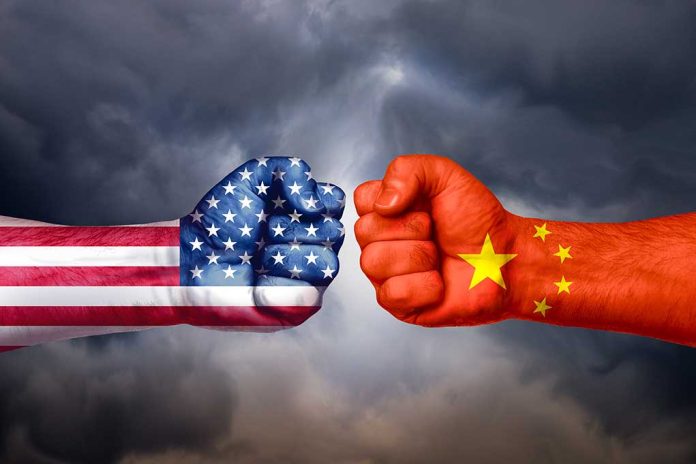
Trump administration officials head to Switzerland for high-stakes trade talks with China that could end the economic standoff pushing tariffs to record levels of 145% on Chinese imports.
Key Takeaways
- Treasury Secretary Scott Bessent and U.S. Trade Representative Jamieson Greer will meet with Chinese Vice Premier He Lifeng in Switzerland this weekend to discuss trade relations.
- President Trump recently increased tariffs on Chinese imports to 145% while China has retaliated with tariffs up to 84% on American products.
- Stock futures rose sharply following news of the meetings, indicating market optimism about potential trade conflict resolution.
- Bessent emphasized that the current tariff situation “isn’t sustainable” and described high tariffs as essentially functioning as an embargo.
- The talks come amid economic pressure on both nations, with American businesses facing rising costs and supply disruptions.
First Major Trade Negotiations Since Tariff Escalation
Treasury Secretary Scott Bessent and U.S. Trade Representative Jamieson Greer will travel to Geneva, Switzerland this weekend for critical talks with Chinese officials. The meetings, scheduled for Saturday and Sunday, represent the first high-level trade discussions since President Trump dramatically increased tariffs on Chinese imports. Chinese Vice Premier He Lifeng will lead Beijing’s delegation in what both sides acknowledge as a crucial step toward addressing the escalating trade war that has rattled global markets and strained bilateral relations.
The stakes couldn’t be higher as the U.S. currently imposes tariffs up to 145% on select Chinese imports, while China has retaliated with tariffs up to 84% on American products. This economic standoff comes after President Trump’s recent decision to increase tariffs on China while simultaneously reducing them on other trading partners. The announcement of these talks prompted U.S. stock futures to rise sharply, reflecting cautious optimism from investors who have weathered significant market volatility driven by trade uncertainties.
BREAKING: Treasury Secretary Scott Bessent says he will be meeting with Chinese officials in Switzerland to begin trade talks with China.
Bessent went on Fox News to break the news.
"The world has been coming to the U.S. and China has been the missing piece. I was going to be… pic.twitter.com/4SpPTNRayx
— Collin Rugg (@CollinRugg) May 6, 2025
Bessent Signals Opening for Compromise
Treasury Secretary Bessent has taken a measured tone ahead of the meetings, emphasizing potential common ground between the economic rivals. “We have shared interests,” Bessent stated, while also acknowledging the current situation with high tariffs “isn’t sustainable.” He compared the elevated tariff levels to an embargo, suggesting the administration recognizes the economic damage being inflicted on both nations and is potentially seeking a path toward de-escalation while still protecting American interests. “Economic security is national security,” said Bessent.
Bessent has framed the upcoming discussions as an opportunity to “rebalance the international economic system” in favor of American interests. This approach aligns with President Trump’s repeated assertions that China is eager to negotiate, though he insists the United States will dictate any deal’s terms. Interestingly, just weeks ago, Bessent mentioned ongoing trade negotiations with 17 other partners but notably excluded China from that list, making this weekend’s meeting a significant shift in diplomatic strategy.
Conflicting Messages and Economic Reality
The path to these negotiations has been complicated by conflicting public statements from both countries. While President Trump previously claimed negotiations were already underway, Beijing denied this assertion, insisting the United States must first lower tariffs before formal talks could begin. Now, China’s Commerce Ministry has confirmed the meeting will take place after “evaluating U.S. information and considering global expectations and interests,” suggesting diplomatic channels have been working behind the scenes despite public tensions.
The economic data highlights the urgency of finding a resolution. While Trump’s tariffs were implemented to boost American manufacturing, they have also contributed to weakened U.S. economic growth even as China’s economy continues to accelerate. American businesses and consumers face rising costs and supply chain disruptions as a direct result of the trade conflict. U.S. Trade Representative Greer has attempted to frame American policy in less confrontational terms, emphasizing that “the plan is to fix the American economy, not to encircle China.”
Looking Ahead to Potential Outcomes
As both delegations prepare to meet in Switzerland, they’ll also engage with Swiss President Karin Keller-Sutter, adding a diplomatic dimension to the economic discussions. The meetings are widely viewed as exploratory rather than conclusive, with both sides likely establishing parameters for future negotiations rather than finalizing any immediate agreements. Key issues expected to be discussed include intellectual property protections, market access, and strategies to address the persistent trade deficit between the nations.
Financial markets will be watching the outcome closely, as any signs of cooperation could trigger significant market movements. However, substantial challenges remain, with both countries needing to balance domestic political considerations against economic necessities. The talks represent a critical juncture in U.S.-China relations, potentially setting the tone for economic engagement throughout President Trump’s second term. Whether this marks the beginning of a thaw in relations or merely a brief pause in escalating tensions remains to be seen.
Sources:
US, China to hold ice-breaker trade talks in Geneva on Saturday
Trump officials Bessent and Greer to meet with Chinese counterparts on trade, economic issues
Trump Officials Set First Meeting with China Amid Tariff War







